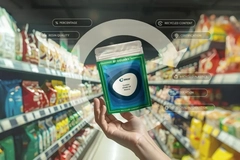Plastic recycling specialist APK bags €130M financing to expand Newcycling
13 Feb 2023 --- Germany-based APK has secured strategic investments from chemical specialist LyondellBasell and the family-owned holding and investment company of the LEGO brand Kirkbi. APK aims to scale its proprietary recycling technology, Newcycling.
MIG Capital, along with LyondellBasell, Kirkbi and other investors, contributed combined fresh capital of €130 million (US$139 million), which APK will use to build two new factories.
“The two plants will likely be located in Central Europe, where there are good waste collection systems and a high demand for top-quality recyclate,” Soren Hein, partner at MIG Capital, tells PackagingInsights.
“We expect to raise debt financing, and to invest the bulk of the equity and the debt in these two plants.”

Susanne Küppers, an executive board member at APK, comments: “Thanks to our new and existing investors, we can now scale up our promising technologies. Low-density PE (LDPE) recycling contributes to minimizing plastic waste, to operate more sustainably and thus to protect our environment on a large scale in the future.”
“We are pleased that our new partners will provide strategic and commercial support, plus financial backing. They also bring additional expertise, for example, in the areas of polymer design and application know-how.”
Signing the agreement to invest in APK (left to right): Matthijs Beijk (LyondellBasell), Dr. Robert Marx (APK), Susanne Küppers (APK), Dr. Soren Hein (MIG), Mikkel Mücke (Kirkbi).Under the agreement, LyondellBasell and Kirkbi will become minority shareholders at APK.
Recycling tech
APK’s core technology is its Newcycling process. The company can process plastic waste, such as multi-layer packaging materials, into high-quality LDPE recyclates with its patented method. This process is not possible with conventional methods, MIG shares.
“We see LyondellBasell’s investment as a strong endorsement. LyondellBasell may also support the development and marketing of products going forward. Kirkbi has a strong investment focus on circular plastics investments as well as an impeccable reputation, and they bring additional understanding to the board of directors,” Hein tells us.
He elaborates on the process employed by APK’s Newcycling technology, saying it can separate and purify complex plastic waste streams, including multi-layer films, into their individual polymer components using a unique solvent-based process.
“This preserves the energy embedded in the polymers, so it is highly attractive in terms of CO2 and economics. It also enables the polymers to go back circularly into the application from which they came in, closing the loop.”
“Newcycling fills a growing need between purely mechanical recycling and chemical methods such as pyrolysis,” Hein shares.Investors and APK senior management and supervisory board at the APK plant, Merseburg, Germany.
Strategic investments
Küppers shares that APK’s Newcycling makes it possible to close the loop even with complex waste streams and to produce high-quality LDPE recyclates from mixed plastic waste. “We have been proving for years that this is also possible on an industrial scale at our plant in Merseburg, Germany,” she says.
Yvonne van der Laan, executive vice president of circular and low carbon solutions at LyondellBasell, adds: “Advancing this technology, through our investment in APK, will enable more plastic packaging waste to be reintroduced back into the value chain and will address the demand from consumers and brand owners for more sustainable packaging.”
“Products made using this unique Newcycling solvent-based technology will complement our existing Circulen product portfolio, which currently offers mechanical and advanced recycling solutions to our customers.”
Meanwhile, Damir Hamzic, head of the circular plastics investment area in Kirkbi, asserts that the company believes APK offers a promising scalable technology in LDPE recycling that can help minimize plastic waste. “We look forward to providing strategic, financial and commercial support while APK establishes technology that will complement mechanical and chemical recycling,” he concludes.
By Radhika Sikaria













